


Insectta is an enterprise in Singapore established in 2019. By developing the technology to extract biomaterials from black soldier flies, Insectta hopes to produce high-value technological products, while reducing food waste and producing side products like organic fertilizers at the same time.
The Challenges
Like many other cities in the world, the problem of food waste is serious in Singapore. In 2019, people in Singapore produced 744 thousand tonnes of food waste in total (Ministry of Sustainability and the Environment, 2021). The amount of food waste has also increased by 20% over the previous decade, and is one of the largest sources of waste. Food waste not only increases the burden of landfills and waste disposal facilities, but also intensifies carbon emissions. It is suggested that food waste can lead to the loss of land, water and biodiversity, as well as the production of extra greenhouse gases that aggravate climate change (Food and Agriculture Organization, 2013). Therefore, the problem of food waste affects or even hinders food production, which further bring impacts on human survival and our quality of life.
The Solution
Insectta established the first urban insect farm in Singapore. The company recycles food waste as the food for black soldier flies, which are insects that help dispose waste in nature. The sources of food waste include commercial partners like soybean shops, a local microbrewery and local community (US News, 2018). By rearing the larvae, Insectta focuses on using technology to extract chemicals from the black soldier flies and produce various value-added biomaterial products. For example, Insectta has been developing chitosan and melanin for pharmaceutical and cosmetics industries, organic semi-conductors that are biodegradable, and animal feed supplements. Insectta is also doing research on efficiently and sustainably extracted biomaterials from black soldier flies. Apart from the biotech side of the company, Insectta also complements local food production by supporting the ‘30 by 30’ initiative of the Singaporean government to satisfy 30% of local nutritional needs by 2030. The company also secondarily turns black soldier fly larvae into fertilizers and animal feed that are used in the crops and animals in their farm and other local farms. The larvae and eggs of the flies are also sold as pet food in the local market. Moreover, Insectta organises farm tours and seminars for the public to educate and promote sustainability, the prospect of insect farming, and the reduction of food waste.
The Impact
Insectta recycles 8 to 10 tonnes of food waste from partners per month as food for the larvae. Despite originally started as an insect farm, Insectta has devoted its efforts in the extraction of biomaterials from black soldier flies. By doing so, they help increase the value of the black soldier fly industry by expanding its potential to beyond just agricultural products, thereby growing this nascent industry and increasing its impact in valorizing food waste. Apart from seeking patents for their extraction technologies, Insectta has also been adding value to its products by developing more high-value biomaterials. Insectta’s idea and effort have been well-recognised in Singapore. Insectta was awarded the LOTUS-NUS Grant for social impact in 2019 for its innovation in deriving biomaterials from black soldier fly in a sustainable way. The company also received funding from the Singaporean Trendlines Agrifood Fund in 2020 for their extraction of chitosan from the insects. Insectta was also one of the finalists of the Hitachi Innovation Challenge for Circular Economy 2021.
Reference
Food and Agriculture Organization. (2013). Food wastage footprint: Impacts on natural resources. Retrieved at: https://www.fao.org/3/i3347e/i3347e.pdf
Ministry of Sustainability and the Environment. (2021, December 16). Food waste. Retrieved at: https://www.towardszerowaste.gov.sg/foodwaste/#partners
US News. (2018, October 25). Can maggots fix Singapore’s food waste problem? Retrieved at: https://www.usnews.com/news/cities/articles/2018-10-25/in-singapore-using-fly-larvae-to-reduce-food-waste